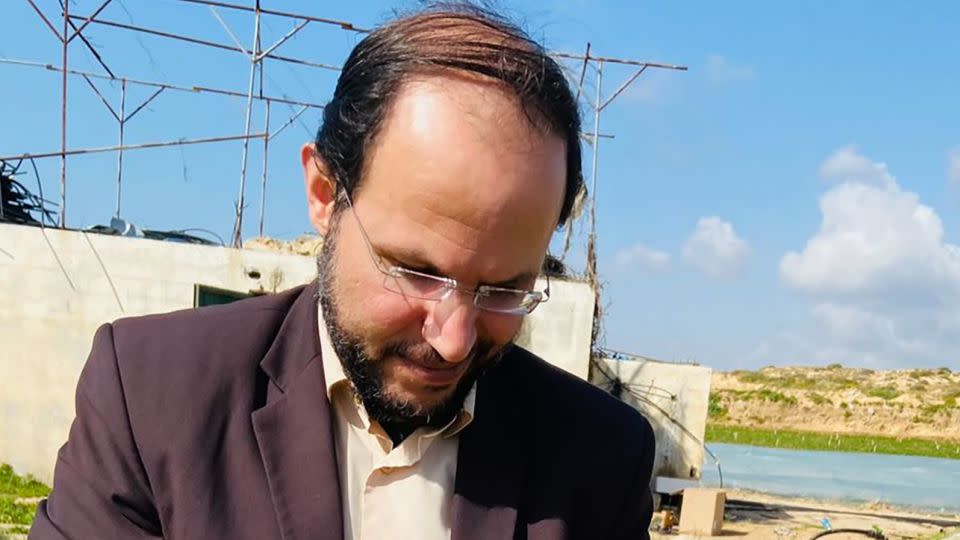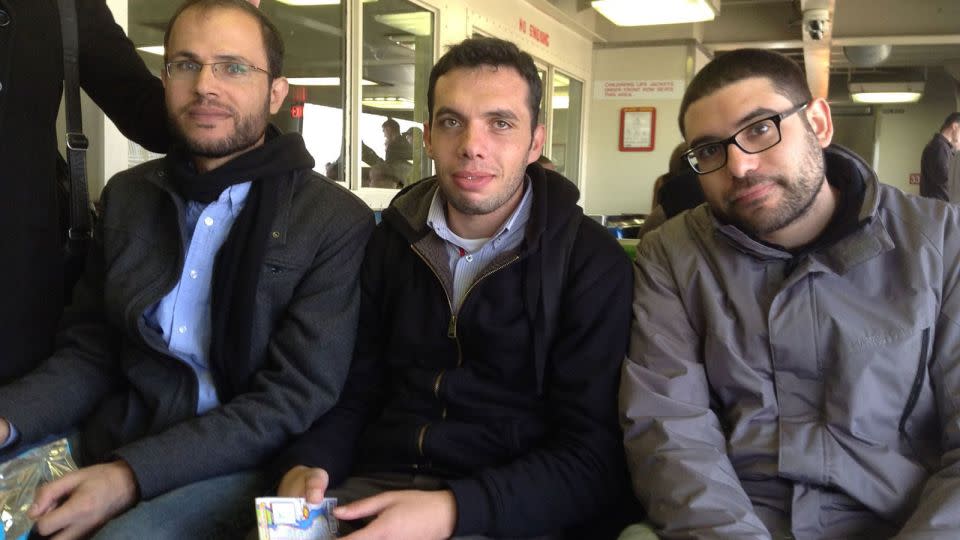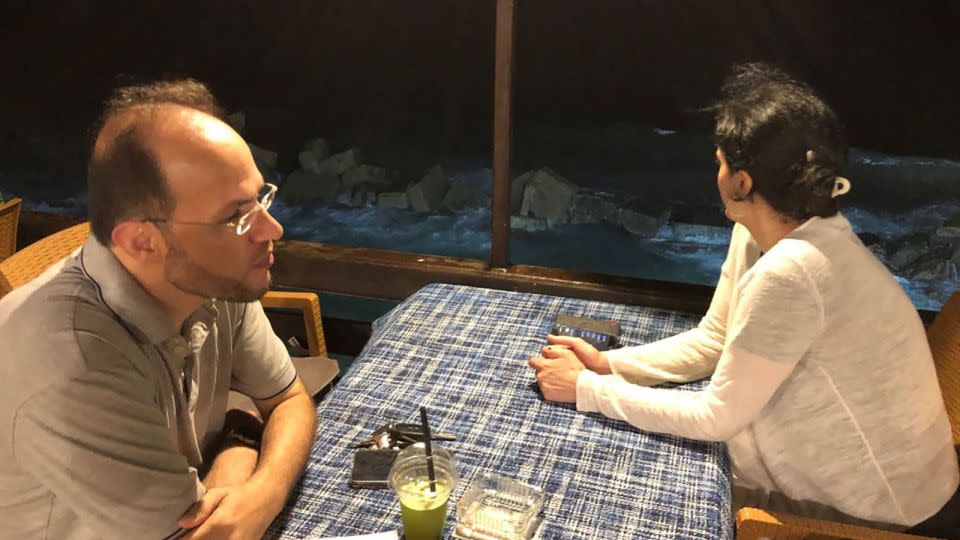Prominent Gaza professor and writer killed in airstrike, weeks after telling CNN he and his family had ‘nowhere else to go’
Editor’s Note: A version of this story appears in CNN’s Meanwhile in the Middle East newsletter, a three-times-a-week look inside the region’s biggest stories. Sign up here.
In October, Refaat Alareer was deliberating whether to stay at his home in the heart of Gaza City, or flee further south with his wife and six children.
As Israeli warplanes bombarded northern Gaza, the Israel Defense Forces (IDF) told civilians to evacuate their homes immediately and go south.
Civilians like Alareer were confronted with an impossible predicament. Stay home and risk being killed, or try to flee without protection. At the time, the 44-year-old writer and academic told CNN he and his family had no choice but to remain in the north, because they “have nowhere else to go.”
“It’s an archetypal Palestinian image of a discussion, a debate on should we stay in one room, so if we die, we die together, or should we stay in separate rooms, so at least somebody can live?” he said.
A professor of comparative literature at the Islamic University of Gaza, Alareer was famed for his role in chronicling Gazan experiences. He was instrumental in nurturing young Palestinian writers and helped them tell their stories in English, according to friends and colleagues.
Alareer spoke to CNN from Gaza City, on October 12 and October 13. He gave consent in written messages to share the recording in the event of his death.
Weeks later, on December 7, Alareer was killed by a strike in Shajaiya, in northern Gaza, his friend and colleague, Jehad Abusalim, confirmed to CNN. He was staying with his brother, his sister, and her four children, who were also killed, according to Abusalim, a writer, 35, based in Washington, DC.
He left behind his wife, and children aged 7 to 21. CNN has been unable to reach members of Alareer’s family.

In 2014, Alareer edited “Gaza Writes Back,” a collection of short stories by young writers documenting their lives under Israeli blockade. He was also co-editor of “Gaza Unsilenced,” a collection of essays, photos and poetry published in 2015 that documented the pain, loss and faith of Palestinians under Israeli siege. He also contributed to “Light in Gaza: Writings Born of Fire,” an anthology published in 2022. A native of Gaza City, he studied at University College London and SOAS, in London.
He was a co-founder of “We Are Not Numbers” – a non-profit organization that aims to amplify the voices of Palestinian youth living in Gaza and the refugee camps.
“We have the faith, we have the belief that we have a fair cause, a just cause, to struggle to fight back for freedom, for basic human rights. We’ve been stripped out of this,” he told CNN.
Israel launched its military operation in Gaza with the stated aim of eliminating Hamas and rescuing the more than 240 hostages taken during the militant group’s October 7 attack, which killed more than 1,200 people in Israel.
Israeli strikes have so far killed about 17,700 Palestinians in Gaza from October 7 through December 9, according to a report published by the Palestinian Ministry of Health in Ramallah on Sunday. The report cites medical sources from the Hamas-controlled enclave. At least 70% of those killed in Gaza were women, children and the elderly, the report said.
CNN cannot independently confirm the number of dead and wounded in Gaza, but on Sunday the Israel Defense Forces said it had struck more than 22,000 targets in Gaza since October 7.
The IDF says it is trying to minimize civilian casualties, and accuses Hamas of embedding itself in civilian infrastructure. UN Secretary-General António Guterres has warned there is “no effective protection of civilians” in Gaza.
Human rights groups have said that Israel’s attacks on civilians amount to a war crime, as does their forcible evacuation.
During his interview with CNN, Alareer called on the international community to see the “humanity” in Palestinian people, adding: “Feel their pain. Put yourself in their shoes.”
He had written a poem anticipating that he might be killed, titled “If I must die.”
Following Alareer’s death, people in New York and London held vigils to honor his memory.
While Alareer’s death is being mourned among Palestinians, some of his comments have caused offense. In a BBC interview he described the October 7 attacks as “a pre-emptive attack by Palestinian resistance” that was “legitimate and moral.”
Memories of war
Gazan civilians are no strangers to the threat of death, having lived through years under siege. Alareer said that recent Israeli strikes on the Palestinian enclave triggered his early memories of war.
Born in Shajaiya, in the eastern part of Gaza City, he said his family was forced to relocate to the Tel-al-Hawa area of Gaza City, after their home was destroyed by Israeli bombardment during the 2014 war that also claimed his younger brother Hamada, who was 27 when he was killed.
“It’s something we don’t talk about. We don’t even want to think about how these kids, the homes, the lives (that) get destroyed again and again every few years,” he recalled.
The sounds of strikes hitting a building feel as though “the whole earth reverberates,” he said.
“Even the slamming of a door sometimes brings you these memories,” he said “That’s why we usually say there is no post-war trauma for Palestinians. It’s nonstop.”

Nine years on, Alareer said he and many other Gazan parents felt “helplessness and despair” because they have no way to protect themselves, or their children, from Israel’s persistent strikes.
He described the emotional and physical trauma sustained by Palestinian children under bombardment.
“The way things usually start is complete fear in the first couple of days,” he said. “This turns into numbness later on, complete indifference, complete submission.
“If you want to pray, you cut it short because there’s bombing around. If you want to eat, you stop eating because there’s bombing around.
“You want to hug your kids like you usually do, or tell them stories or pat them on the head,” he said. “But you don’t want to do it because you don’t want to feel, or make them feel, that this is like a farewell hug.
“We count the years by how many wars our kids survive.”
He had been a vocal critic of Israel and a source of comments that caused offense to people outside Gaza, willing to be interviewed by many news outlets for Palestinian rights.
In his BBC interview as well defending the October 7 attacks, Alareer compared them to the 1943 Warsaw Ghetto Uprising, which represented the largest Jewish resistance effort during the Holocaust.
Following the comments, a BBC spokesperson said his comments “were offensive and we don’t intend to use him again (as a commentator).”
He later accused Israel of fabricating evidence of sexual assault by Hamas on October 7. CNN reported on survivors saying they either directly witnessed sexual violence or saw clear evidence of it.
‘Towering figure in Palestinian society’
Alareer began teaching literature, creative writing, poetry, translation and Shakespeare at the Islamic University of Gaza in 2007. He described himself as a writer and educator.
His death on Thursday sparked tributes from friends, colleagues and students across the globe.
Ra Page, 51, is a publisher and founder of Comma Press, in Manchester, England. He worked with Alareer on numerous literary projects and workshops over the years. They met in person in Gaza City, in August 2022.
“My fondest memories are of jumping into his hilariously small car – definitely the smallest, quirkiest, possibly oldest car in Gaza and driving around listening to audiobooks and podcasts with him. He loved audio literature,” Page told CNN on Friday.
“To describe him; he was generous, above all. Gracious, gentle, patient, funny. He had a wicked sense of humor,” he added.
“He always championed others, ahead of himself. He was a great writer but his mission was to platform and support other writers.”

Alareer was a “towering figure in Palestinian society,” said Abusalim, the writer and friend based in Washington, DC.
“Refaat’s life was not without its challenges. Despite personal tragedies and the harsh realities of life in Gaza, he remained unwavering, using his pen and his voice to fight back, to write back,” he told CNN.
“His teaching wasn’t just about imparting knowledge; it was about empowerment, about using language as a weapon against oppression,” Abusalim added.
Laila El-Haddad, a Gazan journalist and author based in Maryland, said Alareer “raised an entire generation of Palestinian writers in Gaza.”
He taught them “how to use English, the language of the countries that have been responsible for and complicit in their dispossession, genocide and blockade, to narrate their own stories,” added El-Haddad, 45.
Rawan Yaghi, who was taught by Alareer and is now a 30-year-old writer based in Canada, said he was a “leader of literary resistance.”
“His love for storytelling was infectious. He was a force for good, for perseverance, love, camaraderie,” she told CNN.
“We remember and carry on Refaat’s legacy. Refaat the storyteller, father, husband, son, teacher, and friend.”
CNN’s Kareem Khadder, Ibrahim Dahman and Eyad Kourdi contributed reporting.
For more CNN news and newsletters create an account at CNN.com

